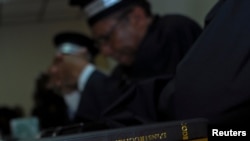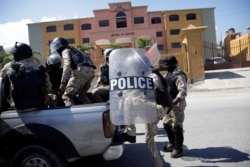Haitian President Jovenel Moise's new penal code, which legalizes abortion and lowers the legal age for consensual sex to 15, has drawn the ire of lawmakers. Former Senator Jean Renel Senatus said the presidential decree goes against Haitian family values.
"Unfortunately, President Jovenel Moise has chosen to put forth a law that is much more liberal than the one we (senators) worked on," he told VOA Creole.
Moise has been ruling by presidential decree since January 2020 because the parliament is out of session. The terms of two-thirds of the Chamber of Deputies and Senate expired months before the pandemic hit. Before the session ended, lawmakers had worked on a new penal code. The presidential decree, announced June 24, voids their work.
According to officials, parliamentary elections have not been held because of the insecurity caused by a series of anti-corruption protests that sometimes turned deadly, roiling the nation, crippling the economy and creating a climate of insecurity during most of 2019.
Presidential adviser Patrick Crispin announced on June 23 that legislative elections are planned for December 2020. In the meantime, there is no parliamentary check and balance on the president’s decrees.
Senatus, whose term expired in January, told VOA he is outraged by the statutes dealing with minors and bestiality.
"Article 384 tacitly recognizes child prostitution. There's a reference to bestiality, which officials from five jurisdictions demanded be sanctioned," he said. "But President Jovenel (Moise) refused to remove the statute. The only concession he was willing to make was that if someone is apprehended for having (sexual relations) with a dog (for example) they would arrest the person who made him commit the act."
Among other additions are six new statutes that mandate stricter punishment for homosexual acts.
Senatus said part of the new code is a word-for-word copy of laws that exist in Canada, France and Belgium. He urged Haitian citizens who are equally outraged to voice their opposition publicly.
Former Sen. Ricard Pierre of the Democratic and Popular Sector party also criticized the new penal code.
"As Democrats, we don't believe we have the right to make choices for citizens, with regards to what is happening inside their homes, their bedrooms," he told VOA. "So to impose their restrictions without publicly debating them first, is a disaster waiting to happen."
Pierre accused the president of protecting the interests of foreign countries rather than working for the good of the nation.
"This (code) doesn't address any of the social issues Haiti is facing today," he said.
Haiti’s Evangelists voiced their opposition to the new code as well.
On VOA Creole's Instagram page, people expressed sadness and disbelief.
"Wow!! So they legalized sexual relationship with a 15 year old!!!! @beyond_flyyy commented.
"This just makes me sad," @mjdaph commented, adding two crying emojis. "I really don't understand how this can happen."
A newly elected parliament would have power to overturn the presidential decree.
Haiti's penal code has not been modified in 185 years.
Jean Robert Philippe contributed to this story.






